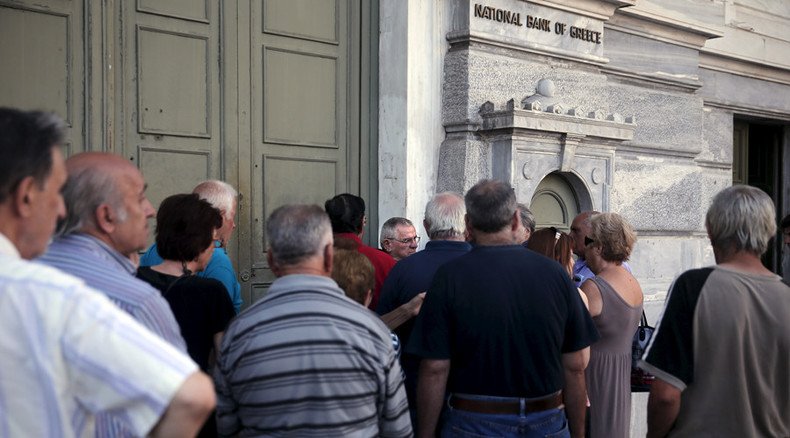3 week bank shutdown cost Greek economy €3 billion - report

The three week closure of Greek banks, with ATM withdrawals limited to €60 a day, has cost the country's economy €3 billion ($3.3 billion), which excludes lost tourism revenue, according to a report.
Estimates by the Panhellenic Exporters Association put the weekly revenue loss due to problems concerning exports at €80 million ($86 million), or a total of €240 million ($259 million) to date, Greece's Kathimerini daily said. The newspaper added that the first three weeks of capital controls have cost retail trade some €600 million ($650 million), with the clothing sector hit hardest.
According to the Athens Chamber of Commerce and Industry (EBEA) some 4,500 containers with raw materials and finished products are currently blocked at customs, since importers cannot carryout any banking transactions.
Another problem, cited by the newspaper, is the backlog of checks and bills of exchange that cannot be paid, meaning that business transactions worth an estimated €6 billion ($6.5 billion) have been frozen, according to the EBEA.
Things are brighter for the travel industry; with data from WebHotelier reportedly pointing to a partial rebound in tourism bookings from foreign markets after the bailout agreement was finally reached between Athens and its European creditors on Monday. At the peak of the three-week crisis new bookings were down by as much as 50,000.
The bank closures were introduced on June 29, after the Greek government rejected austerity demands by European creditors and called a referendum, in which over 61 percent of the country’s citizens voted against the previous terms of the bailout deal. However, as Grexit became an imminent threat, the government tried to avert an imminent financial collapse and was forced to accept a package of fiscal reforms.
Greek banks are set to reopen Monday after the European Central Bank (ECB) raised Greece’s emergency liquidity assistance (ELA) by €900 million ($970 million) to Athens on Thursday.
Until Thursday the ELA stood at €89 billion ($96 billion). The ECB’s refusal to expand the assistance was one of the reasons Greek banks went on holiday for weeks.
However, the head of the European Stability Mechanism (ESM) has warned of a looming collapse of the Greek financial system if Athens skips on the third bailout, agreed with its creditors on July 13.
"If everything should fail, then the Greek banking system will collapse. If the four biggest systemically relevant banks in a country no longer work, this has grave consequences not just for Greece…but also for the whole eurozone," Klaus Regling, head of the ESM, told German broadcaster ARD, quoted by Reuters.
Among the 39 Syriza members who voted against austerity was former Finance Minister Yanis Varoufakis, who stated that the bailout deal was "a new Versailles Treaty,” referring to a deal that demanded huge reparations to be paid by Germany after its defeat in World War One.












